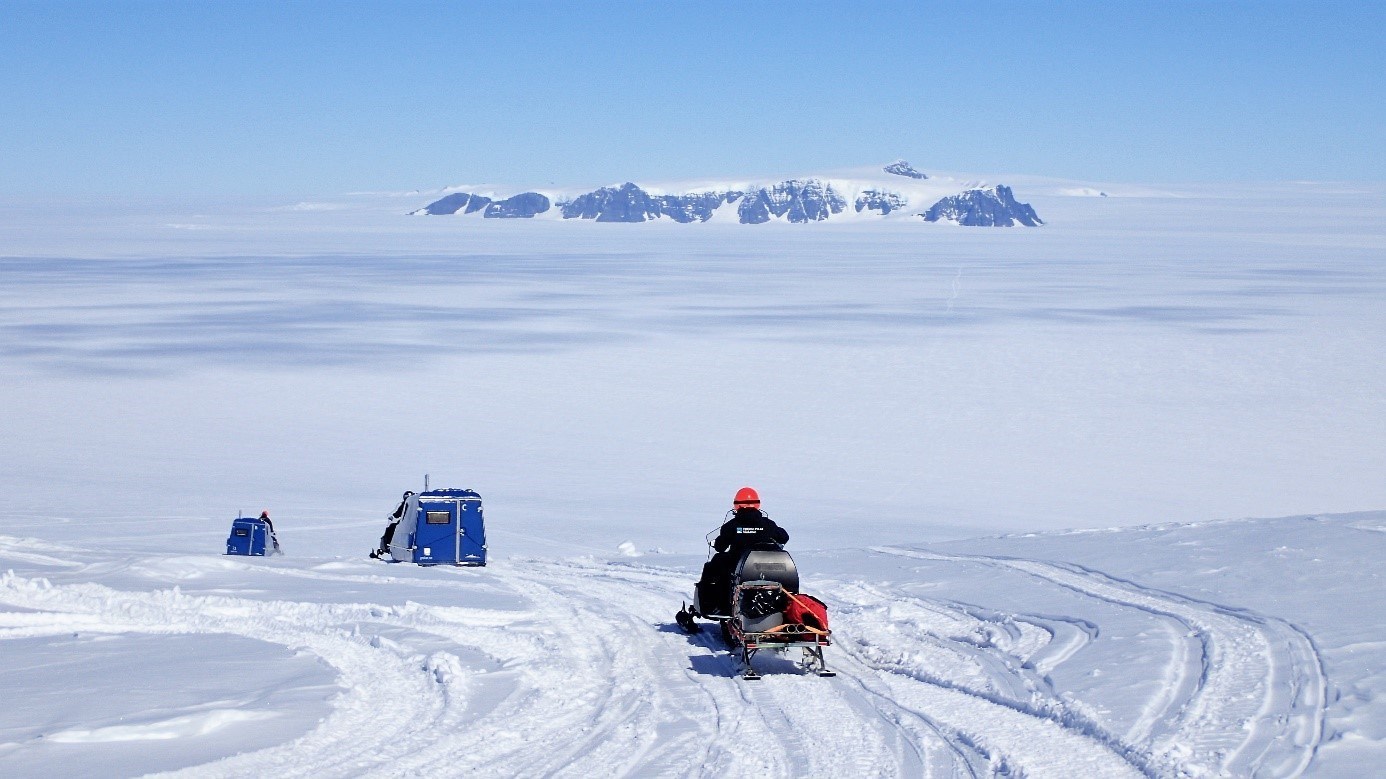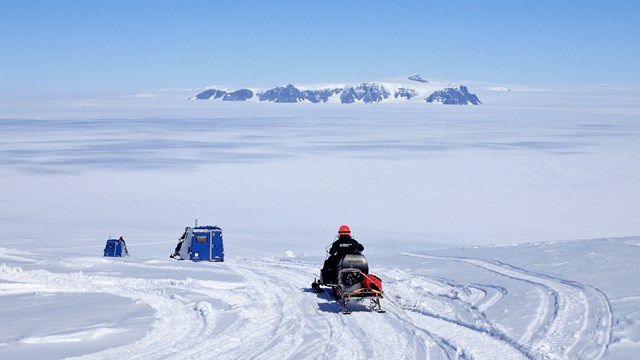Project call Antarctica – iQ2300 expeditions in 2025-2030
 From the expedition DML 2021-22. Photo: Ola Eriksson.
From the expedition DML 2021-22. Photo: Ola Eriksson.
The Swedish Polar Research Secretariat call for research in Dronning Maud Land (DML), Antarctica. The time frame for projects is 4-5 years, with the first field season starting in the austral summer 2025/26.
– The call is closed! –
Researchers affiliated with a Swedish university or research institute are invited to apply for participation with their research projects during expeditions to Antarctica. International collaboration is encouraged. This project call aims to build and strengthen the research theme, East Antarctic Sea level rise contribution in 2300: Integrated Queen Maud Margin Science (iQ2300), addressing scientific questions focused on predicting the future evolution of ice shelves, understanding the melt- and freeze processes occurring in the ice-ocean boundary layer, and how they relate to the steering of intruding water masses caused by local bathymetry and/or ice shelf basal topography, and ice catchment dynamics.
The iQ2300 research theme will study the Riiser-Larsen Ice Shelf (R-LIS), the largest ice shelf in Dronning Maud Land. The iQ2300 expeditions will occur during several field seasons through the Antarctic summer months.
Geographical focus area
The iQ2300 – research theme will build on the earlier efforts of Magic -DML in 2016/2017, 2017/2018 and 2023/20024 expeditions and expand the geographic research area by targeting the Riiser-Larsen Ice Shelf, its catchment and the Polar Plateau above in Dronning Maud Land, Antarctica.
Prerequisites for projects in iQ2300 field expeditions
iQ2300 aims at a multi-disciplinary approach to the terrestrial and marine responses of the Dronning Maud Land margin, one of the most vulnerable parts of the East Antarctic Ice Sheet, across geological (>103 yr), historical (102 yr), and recent (<101 yr) timescales; to inform ocean, atmosphere, ice sheet, and sea level modelling components for improved year 2300 sea level rise estimates for Sweden and worldwide. Field data should address critical areas needed to reduce model uncertainty, and models should integrate the regional field evidence into a global picture of ice sheet evolution and regional sea-level variations. Projects should contribute to SCAR through its research programmes and Action and Expert groups (e.g., RINGS, INSTANT, FRISP and ISMASS). Projects shall contribute to the research theme described here.
Projects should also contribute to Antarctica InSync (International Science & Infrastructure for Synchronous Observation), a new initiative within the Ocean Decade Action Programme that is endorsed by UNESCO. InSync is a project of synchronous scientific observations in Antarctica to allow for a circumpolar assessment of the connections between ice, ocean, climate, environment, and life, including human pressures and their solutions, such as marine protection.
There will be necessary cooperation between different work packages and science areas in the research theme, which demands a highly integrated approach, iQ2300 builds on cross-WP and cross-science area collaboration in the field, depending on available resources and careful planning, and between the empirical science areas, modelling science areas, and societal impact forecast and communication.
Moreover, accepted projects are expected to contribute to a synthesis report after the expeditions. Read more about the Secretariat's Polar Research Process here.
Feasibility
The iQ2300 research theme will be planned and executed to cover the different research topics during the Antarctic summer season 2025/2026 and continue until the Antarctic summer season 2029/2030. The research theme will be designed to cover one or more field seasons during the specified period.
The Swedish Polar Research Secretariat (SPRS) manages research infrastructure located in Dronning Maud Land (DML), East Antarctica and has a well-established research and logistical network in the region. Depending on which polar research vessel that will be available, several logistical setups could be possible to achieve scientific and operational scenarios within the research theme iQ2300. For the operational logistics of the marine field components all basic infrastructure such as i.e., winches and cranes, will be provided by the Swedish Polar Research Secretariat. Specific measuring instruments and research equipment are the responsibility of the research projects.
Any projects that are consistent with the scope of the theme iQ2300 and that can contribute to this research theme are welcome to apply.
To initiate the necessary planning, the Swedish Polar Research Secretariat invites accepted projects to a workshop in Abisko 21-24 March 2024 where the scientific and logistical needs will be discussed.
Application
Submit the application form to office@polar.se. Please use the registration number 2023-222 in the subject line. The last day to apply is 25 February 2024. Download the application form here.
Requested documentation
- Name, affiliation and contact details of the lead applicant of the project proposal.
- Names (can be preliminary or listed as NN) and affiliations of other Swedish-based or international collaborating project team members.
- Number of persons required in the field, needed to execute the project. Indicate what kind of field research components the project aiming for and be as detailed as possible. A terrestrial sampling campaign (e.g., fixed-wing (airborne) ground-penetrating radar (GPR) etc. Specify if there are onboard sampling or observational tasks where the project relies on collaboration with other groups (e.g., CTD/Niskin, sediment sampling, AUV) and indicate how this may influence the required number of onboard participants/berths.
- A scientific project description, including the aim and objectives that also clarify where and how the project work tasks are intended to be performed. Clearly motivate the fit and relationship to the overarching theme of the iQ2300 expedition (appendix 1).
- CV and a list of publications for the lead applicant and any deputy/co-lead participant. In the publication list highlight up to ten selected publications that you find relevant for iQ2300. Also include the number of citations of each publication for these ten (appendix 2).
- Documentation that proves that sufficient and relevant research funding has been granted / is available to the project group. It is understood that this can come from a variety of sources, including external grants from national research agencies in Sweden, EU or elsewhere. Given existing funding cycles, parts of this could be amended until 8 December 2024 (appendix 3).
According to Swedish law, the Swedish Polar Research Secretariat is bound by the principle of the Public Access to Information and Secrecy Act. Upon submission to the Secretariat, project proposals (including appendices) are thus considered general public documents. Consequently, the Swedish Polar Research Secretariat is obligated to disclose application documents if requested.
Assessment and Selection
Submitted applications will be assessed according to the following criteria: i) scientific excellence, ii) relevance to the research theme, feasibility onboard a Polar research vessel and iii) how the project describes the applicability to synthesis work. A research project can only be accepted if the project has received funding through research financiers who use peer-review in selection. There may be an exception to this requirement if the applicant can argue for other merits, that are highly relevant to the topic.
Contact
If you have any questions, please contact
Cecilia Lund
Senior Research Officer, Swedish Polar Research Secretariat
cecilia.lund@polar.se
The Swedish Polar Research Secretariat opens two calls for research projects towards Antarctica and the Southern Ocean that apply to expeditions during the Antarctic summer starting in season 2025/2026 and ongoing, within two different themes. The themes iQ2300 and Pulse of Weddell Sea were selected via an open call within the Polar Research Process by the Swedish Polar Research Secretariat in 2023.

